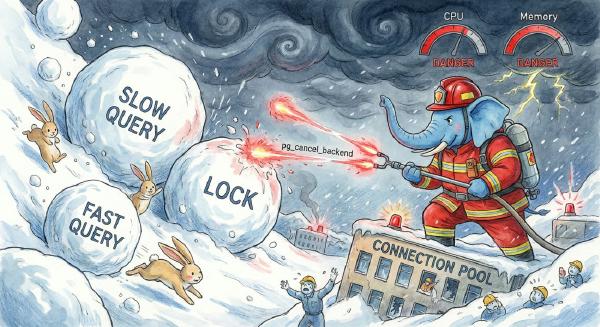PostgreSQL is great, but that doesn’t mean it’s Bug-Free. This time in the production environment, I encountered another very interesting case: a production incident caused by pg_dump. This is a very subtle bug triggered by Pgbouncer, search_path, and special pg_dump operations.
Background Knowledge#
Connection Contamination#
In PostgreSQL, each database connection corresponds to a backend process that holds some temporary resources (state), which are destroyed when the connection ends, including:
- Parameters modified in this session.
RESET ALL; - Prepared statements.
DEALLOCATE ALL - Open cursors.
CLOSE ALL; - Listened message channels.
UNLISTEN * - Execution plan cache.
DISCARD PLANS; - Pre-allocated sequence values and their cache.
DISCARD SEQUENCES; - Temporary tables.
DISCARD TEMP
Web applications frequently establish large numbers of database connections, so in practice, connection pools are usually used to reuse connections and reduce the overhead of connection creation and destruction. Besides using various language/driver built-in connection pools, Pgbouncer is the most commonly used third-party middleware connection pool. Pgbouncer provides a Transaction Pooling mode, where the connection pool assigns a server connection to the client connection when a client transaction begins, and when the transaction ends, the server connection is returned to the pool.
Transaction pooling mode also has some issues, such as connection contamination. When a client modifies the connection state and returns the connection to the pool, other applications may be affected unexpectedly. As shown in the diagram below:

Assume there are four client connections (frontend connections) C1, C2, C3, C4, and two server connections (backend connections) S1, S2. The database default search path is configured as: app,$user,public, and the application knows this assumption and uses SELECT * FROM tbl; to access table app.tbl in schema app by default. Now suppose client C2 executed set search_path = '' while using server connection S2, clearing the search path on connection S2. When S2 is reused by another client C3, C3 executing SELECT * FROM tbl will error because it cannot find the corresponding table in the search_path.
When client assumptions about connections are broken, various errors can easily occur.
Incident Investigation#
The production application suddenly reported massive errors triggering circuit breaker, with error content being large amounts of objects (tables, functions) not found.
The first instinct was that the connection pool was contaminated: some connection modified the search_path and then returned the connection to the pool. When this backend connection is reused by other frontend connections, objects cannot be found.
Connecting to the corresponding pool, I found that indeed there were cases of connection search_path contamination - some connections had their search_path cleared, so applications using these connections couldn’t find objects.
psql -p6432 somedb
# show search_path; \watch 0.1Using the administrator account in Pgbouncer to execute the RECONNECT command, forcing reconnection of all connections, search_path was reset to default values, and the problem was resolved.
reconnect somedbBut the question arose: what application modified the search_path? If the source of the problem isn’t investigated clearly, it might recur in the future. There are several possibilities: business code changes, application driver bugs, manual operations, or connection pool bugs. The most suspicious of course is manual operations - if someone used a production account to connect to the connection pool with psql, manually modified search_path, then exited, this connection would be returned to the production pool, causing contamination.
First, I checked the database logs and found that all error log records came from the same server connection 5c06218b.2ca6c, meaning only one connection was contaminated. I found the critical moment when this connection started continuously erroring:
cat postgresql-Tue.csv | grep 5c06218b.2ca6c
2018-12-04 14:44:42.766 CST,"xxx","xxx-xxx",182892,"127.0.0.1:60114",5c06218b.2ca6c,36,"SELECT",2018-12-04 14:41:15 CST,24/0,0,LOG,00000,"duration: 1067.392 ms statement: SELECT xxxx FROM x",,,,,,,,,"app - xx.xx.xx.xx:23962"
2018-12-04 14:45:03.857 CST,"xxx","xxx-xxx",182892,"127.0.0.1:60114",5c06218b.2ca6c,37,"SELECT",2018-12-04 14:41:15 CST,24/368400961,0,ERROR,42883,"function upsert_xxxxxx(xxx) does not exist",,"No function matches the given name and argument types. You might need to add explicit type casts.",,,,"select upsert_phone_plan('965+6628',1,0,0,0,1,0,'2018-12-03 19:00:00'::timestamp)",8,,"app - 10.191.160.49:46382"Here 5c06218b.2ca6c is the unique identifier for that connection, and the following numbers 36,37 are the line numbers of logs generated by that connection. Some operations aren’t recorded in logs, but fortunately here, the normal and error logs are only 21 seconds apart, allowing precise location of the incident time.
By scanning command operation records at that moment on all whitelist machines, I precisely located one execution record:
pg_dump --host master.xxxx --port 6432 -d somedb -t sometableHmm? Isn’t pg_dump an official built-in tool? Could it modify search_path? But intuition told me it’s really not impossible. For example, I remember an interesting behavior - since schema is essentially a namespace, objects in different schemas can have the same name. In older versions, when using -t to dump specific tables, if the provided table name parameter doesn’t have a schema prefix, pg_dump would dump all tables with the same name by default.
Looking at the source code of pg_dump, I found there really is such an operation. Taking version 10.5 as an example, I found that during setup_connection, it indeed modifies search_path.
// src/bin/pg_dump/pg_dump.c line 287
int main(int argc, char **argv);
// src/bin/pg_dump/pg_dump.c line 681 main
setup_connection(fout, dumpencoding, dumpsnapshot, use_role);
// src/bin/pg_dump/pg_dump.c line 1006 setup_connection
PQclear(ExecuteSqlQueryForSingleRow(AH, ALWAYS_SECURE_SEARCH_PATH_SQL));
// include/server/fe_utils/connect.h
#define ALWAYS_SECURE_SEARCH_PATH_SQL \
"SELECT pg_catalog.set_config('search_path', '', false)" Bug Reproduction#
Next was reproducing the bug. But oddly, I couldn’t reproduce the bug when using PostgreSQL 11. So I looked at the complete history of the culprit, restored its thought process (found pg_dump and server version mismatch, tried different things), and using different versions of pg_dump finally reproduced the bug.
Using an existing database named data for testing, version 11.1. The Pgbouncer configuration used is as follows. For easier debugging, the connection pool size has been reduced to allow only two server connections.
[databases]
postgres = host=127.0.0.1
[pgbouncer]
logfile = /Users/vonng/pgb/pgbouncer.log
pidfile = /Users/vonng/pgb/pgbouncer.pid
listen_addr = *
listen_port = 6432
auth_type = trust
admin_users = postgres
stats_users = stats, postgres
auth_file = /Users/vonng/pgb/userlist.txt
pool_mode = transaction
server_reset_query =
max_client_conn = 50000
default_pool_size = 2
reserve_pool_size = 0
reserve_pool_timeout = 5
log_connections = 1
log_disconnections = 1
application_name_add_host = 1
ignore_startup_parameters = extra_float_digitsStart the connection pool and check search_path - normal default configuration.
$ psql postgres://vonng:123456@:6432/data -c 'show search_path;'
search_path
-----------------------
app, "$user", publicUsing pg_dump version 10.5, initiating dump from port 6432:
/usr/local/Cellar/postgresql/10.5/bin/pg_dump \
postgres://vonng:123456@:6432/data \
-t geo.pois -f /dev/null
pg_dump: server version: 11.1; pg_dump version: 10.5
pg_dump: aborting because of server version mismatchAlthough the dump failed, when checking the search_path of all connections again, you’ll find that connections in the pool have been contaminated - one connection’s search_path has been modified to empty:
$ psql postgres://vonng:123456@:6432/data -c 'show search_path;'
search_path
-------------
(1 row)Solution#
Configuring both pgbouncer’s server_reset_query and server_reset_query_always parameters can completely solve this problem.
server_reset_query = DISCARD ALL
server_reset_query_always = 1In TransactionPooling mode, server_reset_query is not executed by default, so you need to configure server_reset_query_always=1 to force execution of DISCARD ALL to clear all connection state after each transaction. However, this configuration comes with a cost. DISCARD ALL essentially executes the following operations:
SET SESSION AUTHORIZATION DEFAULT;
RESET ALL;
DEALLOCATE ALL;
CLOSE ALL;
UNLISTEN *;
SELECT pg_advisory_unlock_all();
DISCARD PLANS;
DISCARD SEQUENCES;
DISCARD TEMP;If these statements need to be executed after each transaction, it will indeed bring some additional performance overhead.
Of course, there are other methods, such as administrative solutions to eliminate the possibility of using pg_dump to access port 6432, managing database accounts with dedicated encrypted configuration centers. Or requiring business parties to use schema-qualified names to access database objects. But all might have gaps, not as direct as forced configuration.








